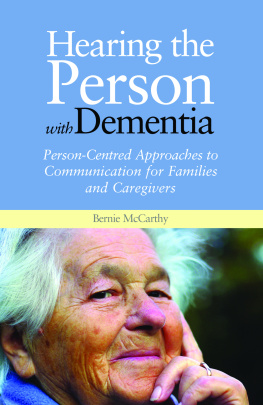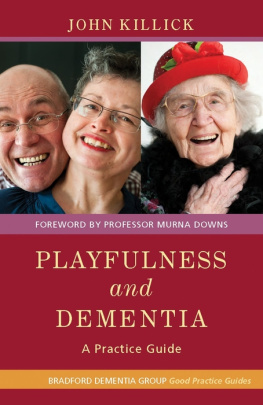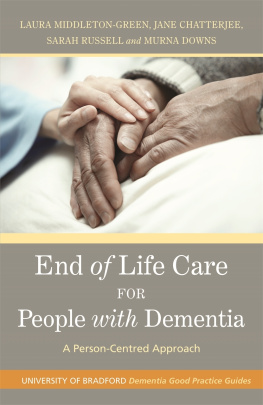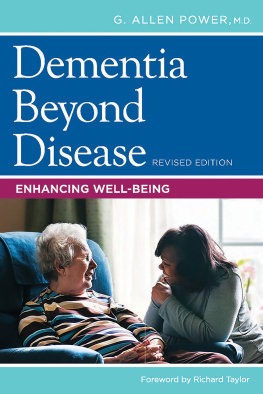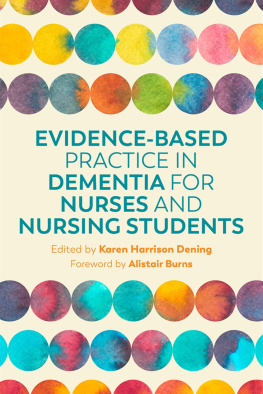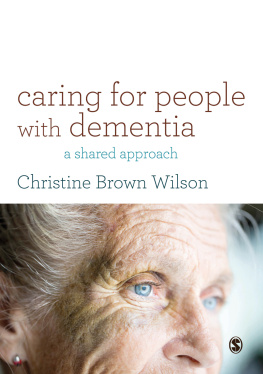FOREWORD
From the time of our conception, we touch and are touched. These experiences continue throughout our lives, however long or short, joyous or traumatic, and are often taken for granted. Luke Tanners inspirational and instructive book gently reminds us how crucial this sense of ours is, both to ourselves as human beings, and to our relationships with the outside world.
According to current statistics, more of us and our loved ones are now likely to develop dementia. Yet in the modern era of risk-averse, task only touch care environments, even best practice models of care are sorely lacking in informed and proactive approaches to touch, through insufficient knowledge, fear and lack of confidence. This book brings us face to face with the importance of touch, without which we would all wither and perish. It places the lived experience of dementia patients alongside our own, and is written in a personal yet professional style that invites us to re-examine our methods and find out how to support those with dementia with greater sensitivity.
It is a gift for us all and, in our professional role of caring and supporting men and women living with dementia, I believe it is exactly what we have all been waiting for.
Luke Tanner brings to this book his extensive professional training and experience as a massage therapist and training consultant across care environments for people living with dementia, in addition to his new role as a hands-on father. The depth and richness of his learning and knowledge create the certainty that we as readers are in good hands. Lacking in jargon, dogma or ego, the writing is poetic yet assured. Countless hours of hard work, conversations and therapeutic relationships shine through between the lines, and give us confidence in a work based on research, experience and integrity.
Embracing Touch in Dementia Care is a fine example of authenticity, clarity, honesty, openness and readability. This is achieved through reflective practice, personal sharing, concrete examples, simple explanations of complex themes, illuminating vignettes and a trove of stimulating, supportive exercises. Without sentimentality, Lukes own needs and experience of touch with his infant daughter are exemplified to create an easy-to-understand model for the early experience of human touch, and what we carry through to our adult lives, with and without dementia.
It would be difficult to find elsewhere a more engaging and clearer description of Attachment Theory as it relates to touch. We are given practical ways to adapt our behaviour to particular attachment styles. Also included are helpful references to consent and capacity legislation, made easy so as not to bog us down.
The chapters neatly outline the role of person-centred care with regards to many forms of touch, in ways that illuminate our understanding and either encourage us to do things differently from now on, or affirm us in what we are already doing. We are equipped with tried-and-tested exercises to share in the work place, and guidance on how changes to our language can help us better reflect our intentions and hoped-for outcomes.
Without ever being judgemental of our current state of practice or approach, or dogmatic in his belief that what he offers is a real alternative, Luke says:
touch is not and never can be a peripheral issue in dementia care. It is a central feature that has a huge impact on peoples quality of life; it can make or break relationships, create or alleviate distress, erode or sustain personhood, promote or undermine autonomy. In undermining personhood, experiences of touch in care can function in parallel with the experience of dementia to contribute to the behavioural and psychological symptoms of dementia.
Luke Tanner is deeply perceptive and appreciative of the feelings and responses of people living with dementia, and their carers and relatives. Written especially with professional carers, nursing staff and residential care managers in mind, Embracing Touch in Dementia Care provides knowledge and understanding to encourage high levels of successful risk-taking around touch. It is through Lukes person-centred lens, focusing on the individual and the relationships themselves, that we may see more authentic ways of touching and being touched. This mutuality of experience at first surprises, then reminds us that this is what a true caring is all about. We have come to the heart of the matter. Throughout the book I found myself cheering alongside care staff, relatives and persons living with dementia as they truly embraced one another, body and soul.
Danuta Lipinska, MA, RegMBACP (accred.)
Counsellor, Supervisor, Training Consultant,
Specialist in Ageing and Dementia Care
Author of Person-Centred Counselling for People with Dementia:
Making Sense of Self (2009, Jessica Kingsley Pulishers)
INTRODUCTION

Physical contact is an everyday part of care work. Generally, the more help someone needs the more that person will need to be touched in one way or another. Professional carers represent a group of people who are touching and being touched by other people throughout their life. Yet professional carers are rarely given the opportunity to reflect on the role touch plays in their work or how it impacts on the people they care for. Consequently there tends to be a lot of confusion about what is appropriate when it comes to touch in professional care settings. When the risks associated with touching vulnerable adults are added to this confusion there are plenty of reasons why many carers may start to have doubts about the place of physical affection in professional care. In the absence of a focused discussion and debate on touching in professional care and caring relationships, attitudes towards touch within the care sector are vulnerable to becoming overly determined by discourses of abuse, exploitation and litigation.
While many healthcare professionals challenge the notion of being emotionally detached and maintaining a professional distance, many professional carers remain concerned about getting too close. Consequently as a professional carer it is not very clear how close or how far away you should be 100cm, 50cm, 25cm? Of course, the idea of an exact measurement is absolutely absurd! This is because when talking about being distant or being close to someone we are not talking literally, but metaphorically. That is to say, we are talking about the quality of a relationship between people rather than their actual physical proximity to one another. In those care settings where touch is taboo, however, it is inevitable that relationships between people living and working in care will be affected. After all, our closest, affectionate and most trusting relationships are generally with people whom we have touched affectionately, whether it be holding hands, doing a high five, leaning on someone, hugging, kissing, caressing or wrestling (I had a big brother!). In fact, our longest-lasting and closest relationships tend to be the ones that have involved lots of these different ways of being in touch. These very relationships are often the ones that matter most to us. They are the relationships that we seek out in times of distress, that help us to feel we belong, in which we feel loved and that remind us of who we are. This book is as much about these relationships as it is about touch. This is because how we touch each other inevitably shapes our relationship to one another. Affectionate touching actually plays a vital role in nurturing the very relationships essential to our well-being. When touch is confined to practical procedures and tasks in dementia care, carers will struggle to develop the kind of relationships that people with dementia need to feel loved, safe and secure.


